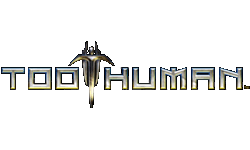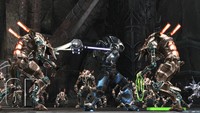|
|

|
PLATFORM
|
Xbox 360
|
BATTLE SYSTEM
|

|
INTERACTION
|

|
ORIGINALITY
|

|
STORY
|

|
MUSIC & SOUND
|

|
VISUALS
|

|
CHALLENGE
|
Very Easy
|
COMPLETION TIME
|
Less than 20 Hours
|
|
OVERALL

|
+ Unique twist on an old tale.
+ Great visuals.
- Horrible camera.
- Strange game balance.
- Way too short.
|
Click here for scoring definitions
|
|
|
Ten years is a long time. In ten years we've seen two console generations die and two more sprout from their ashes. With those ten years past, Silicon Knights' long awaited action RPG Too Human has finally seen the light of day. Like Star Wars, Too Human takes place long, long ago and yet somehow in the future, taking ancient Nordic myths and beating them with the sci-fi stick. Coupled with a fast-paced combat system, it is a unique and memorable experience, despite some significant issues weighing it down.
Although Too Human's Norse roots have been known since the game was first announced, it is surprising to see just how closely the tale sticks to its source material. In fact, with the exception of a few minor details and the science fiction motif, Too Human is a near exact retelling of classic Norse mythology. The story places the player in the role of Baldur, and begins with Hermod rescuing him from Helheim, the Norse underworld. From here events unfold that lead the gods of the Aesir ever closer to Ragnarok, the great war at the end of the world. If questions arise at this point as to why Baldur is in Helheim to begin with, and who the heck Hermod is, one can fault the storytelling. It's hard to fault the story itself for any confusion that comes up, as for all intents and purposes, Too Human is a very faithful and well-conceived adaptation of a truly classic tale, but unfortunately the game doesn't have the centuries of history, worship, and precursor myths to support it.
The biggest issue Too Human faces is that, barring a well-versed knowledge of Norse history, the player is not likely to have any clue who any of these characters are, how they relate to each other, or really what's going on at all. Names and places are thrown into the fray at a blistering pace, and the player is expected to know their source immediately; Wikipedia is virtually a necessity to follow the story. Once these things are known, however, the science fiction retooling is extremely enjoyable and, incredibly, holds together perfectly. Major events throughout the story hold true to their mythological origins.
One has to question, though, why the entire tale wasn't fit into a single game. Too Human is disappointingly short, wrapping up after a mere ten to fifteen hours, and with ten years of production time beneath it, it's rather insulting that the story is being split into three parts rather than a single, thirty hour game. Although the game does provide a decent amount of replayability thanks to its five character classes, two-player online co-op, and level cap that stretches far beyond a single playthrough, thirty hours has become something of a standard length in the gaming industry. Splitting it into three seems greedy and unnecessary.
Regardless of its dubious length, Too Human does manage to provide a very enjoyable gameplay experience. Much like the Diablo series, Too Human takes the form of a dungeon crawling role-playing adventure, pitting the player against hordes of foes throughout four lengthy dungeons. And they are lengthy, despite the game's overall brevity. Each of these four dungeons will likely take a player a solid two to three hours to complete.
 Don't talk back to a god.
Don't talk back to a god.
|
|
Combat is something of an odd affair, as the control scheme is, to say the least, unorthodox. Battles take place in real time in a typical hack-and-slash manner, but the primary control for attacking is the right analog stick. Although unusual, it works surprisingly well. By simply tilting the stick towards nearby enemies, Baldur will attack them, sliding across the ground from foe to foe in what can only be described as an awesome spectacle. This provides an added bonus of preventing the painful hand cramps caused by frantic button mashing that so many action RPGs provide.
It would hardly be an RPG with only basic attacks backing it up, however, no matter how impressive they may be to watch. Baldur is also capable of attacking with a variety of guns, providing the other primary form of combat. Guns and melee weapons can be used in conjunction with each other, and swapping between them for varying effects can be a blast. As an example, by tapping the right analog stick instead of holding it down, enemies can be launched into the air where they can be juggled by constant gunfire. As attacks are unleashed, a combo meter builds up, granting up to three combo points once full. These combo points can be spent to unleash class-specific battle cries, providing a variety of different effects, or devastating Ruiner attacks, blast-waves that annihilate all surrounding enemies. Finally, Baldur is able to make use of a tool called a spider, the effect of which is also determined by class.
The use of the right analog stick for attacking has a rather frustrating side effect, unfortunately. The camera is simply atrocious. While God of War proved that a player-controlled camera isn't necessary for an action game to function, Too Human fails miserably in this regard. It turns in strange directions at strange times, usually doesn't look where the player wants it to, and for some reason suddenly changes to a fixed camera in certain, entirely unnecessary places. Needless to say, the player can expect to be fighting it throughout the game.
Too Human also features extensive character customization options. Each of the five classes have three distinct specialization trees that can be developed by spending points earned with each level gained. Players also get to choose an alignment of either human or cybernetics, both of which provide a new supply of customization options. Choosing human or cybernetics also provides a bonus to Ruiner attacks. While cybernetic-aligned characters gain access to special weapon-specific Ruiners, human-aligned characters gain the ability to call upon an ancient spirit to deal damage to a significantly increased area.
There are also extensive loot options, which include a wide assortment of armor (all of which modify character appearance), plenty of weapons, and special runes which can be used to customize items in a variety of ways. Ranged and melee weapons come in three different types, and of each of those, three sub-categories are available. Melee weapons can be one-handed, two-handed, or dual-wielded, while ranged weapons can have slug, plasma, or laser ammunition.
 Swarms of enemies.
Swarms of enemies.
|
|
Although the gameplay remains fun throughout, there are some balance issues that may lead to frustration. While the first level is quite well balanced and shouldn't pose much problem for most players, the later levels become extraordinarily difficult in places, with death occuring on an extremely frequent basis. However, despite this, the game remains very easy due to the fact that there is no real penalty for dying other than being forced to watch a fifteen second cutscene. Armor also takes a small amount of durability damage, but it's replaced so quickly that it really has no effect on the overall game. This, of course, removes any kind of challenge the game might pose, as one can simply rush into a horde of enemies without regards to the consequences. What's particularly odd about this is that the game provides no methods for actively healing aside from a single class, relying instead on randomly dropped health pick-ups. A simple change in this regard probably would have rebalanced the game and allowed for a more significant death penalty.
While the game has some unfortunate issues in the story and gameplay departments, it is quite outstanding on the visual and audio fronts. The graphics are impeccable, particularly the battle animations, and the art style is unique and attractive. Much of the environmental design features a hybrid of cold technology and old stonework, including massive statues of spear and sword-wielding warriors. In contrast to this, the cyberspace areas, which Baldur must explore to open blocked passages throughout the game's four dungeons, are lush, green, and quite beautiful to behold. In one particular area, massive roots from the world tree Yggdrassil can be seen stretching down from the sky in the distance.
The game's score is also quite well done, composed mostly of epic, orchestral pieces, punctuated by a few edgier rock and techno songs. The voice acting is also of excellent quality, though it does vary. Crispin Freeman's portrayal of Baldur is quite good, as are the voices for Loki and Thor. Heimdall, on the other hand, sounds rather stilted. The dialogue, thankfully, is top-notch, which manages to hold things together where the voices falter.
Too Human is something of a mixed bag. There is an excellent game here, but it's buried beneath layers of problems. In the end, the game simply doesn't live up to the lofty claims made by director Denis Dyack. But despite its faults, Too Human's unique concept and addictive, fast-paced combat manage to hold it together. Fans of Norse mythology will easily find something to enjoy here, but with its short playtime and incomplete story, Too Human's price tag may be hard to justify.
Review Archives
|









